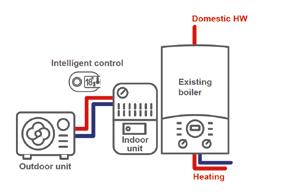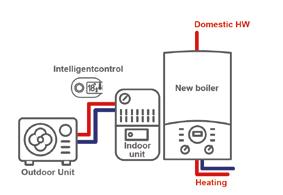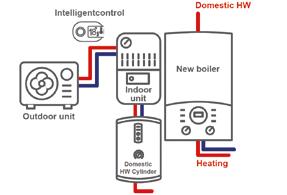
7 minute read
Hybrid heating
A stepping stone to low carbon heating
The government should provide more support for hybrid systems as a practical way to achieve low-carbon home heating, says the Heating and Hotwater Industry Council.
The Heat and Buildings Strategy, launched last year, outlined the key technologies in the UK’s transition to net zero. At its centre is the £450 million Boiler Upgrade Scheme, offering homeowners grants of up to £6,000 to fit heat pumps.
However, the scheme extends only to all-electric systems and hybrid set-ups are not currently eligible for funding.
HHIC director Stewart Clements says: “The supporting initiatives surrounding heat pumps demonstrate the key role that this technology will play in the nation’s decarbonisation efforts.
“It’s important to acknowledge that transitioning directly to all-electric technology simply isn’t going to be an option for many consumers. For this reason, it’s vital that this level of support is extended to hybrid systems too as a means of bridging the gap.”
The case for hybrid heating systems is set out in the HHIC’s white paper, Hybrid Heat Pumps: A Flexible Route to Decarbonise Heat. Here, the HHIC highlights that opting for a hybrid system allows for an immediate reduction in carbon emissions for those who currently can’t change to all-electric heating.
From a practical perspective, homeowners can then make gradual improvements to the fabric of their property to increase energy efficiency, before making the full switch to an all-electric system at their convenience. Hydrogen boilers may also be an option in the longer term so consumers have the flexibility of different fuel options including off-grid biofuels.
Elizabeth Wilkinson, chair of the HHIC Hybrids Group, says: “The UK’s ambitious net-zero targets mean there is a real need to decarbonise our homes and buildings. With the varied and complex housing stock in the UK, it is imperative that we take a pragmatic view and utilise every available option.
“It’s clear that we will see significant diversification of technologies used to supply homes with heating and hot water. Hybrid heat pumps can play a role in this by providing a consumerfriendly stepping stone to full decarbonisation, whether that’s through decarbonisation of the gas grid or an upgrade to a full electric solution.
“Hybrid heat pumps are a practical solution that enable carbon reduction in homes now, and with recommendations in this paper, such as clearly defined standards for hybrid control to ensure carbon savings, they should not be overlooked in policy as a route towards net zero.”
The white paper also raises the issue of skills and training, with an emphasis on understanding the effect that building fabric and insulation has on thermal performance and heat demand. This can be measured through room-by-room heat-loss calculations, which now form the basis of many training schemes offered by HHIC manufacturer members.
Stewart adds: “While it would be fair to say that more manufacturers are launching all-electric systems, the key challenges to uptake here are accessibility and attractiveness to the consumer.
“In this sense, hybrid systems may serve as an effective intermediary between traditional gas boilers and low-carbon heating so that we hit the government’s shorter-term goals. For this reason, the HHIC strongly advocates that the government adopts a revised position on this technology, as we believe it to be one of the most practical routes to net zero.”
What’s right for your customer
Martyn Bridges, director of Technical Services at Worcester Bosch, agrees: He says: “It’s never been more important to understand what the right heating solution is for your customer. It’s not just about the moves towards low-carbon or zero-carbon heating and hot water but knowing your customer’s wishes and financial ability to invest in changing their current boiler to something else.
“While hybrid heating systems may not necessarily be ambitious enough for the government’s net-zero roadmap, they may well be the best technology to help homeowners transition to a greener way of heating their homes.
“The government claims that hybrid systems are not entirely ambitious enough for the net-zero transition. But strangely, they are accepted as part of the ‘market mechanism’, so they will count towards the quota of heat pumps that a boiler manufacturer will be required to sell from 2024 onwards.
“We believe we will continue to see hybrids opted for, particularly in existing properties where space and cost are issues, where changing radiators and microbore pipework will be disruptive and costly.
“With a hybrid system, unlike a heat pump system, you can generally inherit the existing heating system without too many modifications needing to be made to the space and the system itself.
“Hybrid systems don’t get us to net zero, but they get us to nearly net zero without all the added disruption and cost of replacing the entire heating system. It will ultimately now come down to the choice and preference of the
“By using a hybrid, 80 per cent of the space heating demand is delivered by a technology that is around three times more efficient (based on energy input/output controls strategy and usage) when compared to a condensing gas boiler that has an energy efficiency of <1.
“On a hybrid system, where the heat pump meets 80 per cent of space heating demand and a gas boiler covers the remainder, you can assume an average Coefficient of Performance (CoP) around 2.6. This will vary depending on house type and age, but for many it will be a cheaper and less disruptive choice than using a heat pump on its own.” Hybrid Heat Pumps: A Flexible Route to Decarbonise Heat
Cost comparison
5kW hybrid – heat pump (with boiler) and intelligent control 5kW heat pump with intelligent control for adding to already installed boiler 12kW heat pump with intelligent control (comparison)
Price range (for customer) £2,300-£3,400 £1,800-£2,400 £5,000-£6,000
A stepping stone to low carbon heating
homeowner when it comes to opting for hybrid, and a minimal disruption solution that helps towards net zero can be a sensible option for many.”
The government is taking a purist approach by not incentivising them, says Baxi’s managing director Karen Boswell. “Electrically driven heat pumps… will become the main source of heating in new-build homes from 2025. However, fitting this type of technology in the UK’s existing housing stock often requires substantial modifications to the property.
“We therefore believe that the UK government should be looking at hybrids. Hybrids could reduce gas usage by up to 70 per cent and have been proven to be effective by our parent group BDR Thermea in the Netherlands: yet this relatively simple, easy-toinstall option is almost non-existent in the UK.
Purist approach
“The government is taking a very purist approach by not incentivising hybrids. By not offering grants, it could be preventing existing homes across the UK from accessing efficient, low-carbon heat.”
On the need for future skills and training, Karen adds: “We really need an ambitious industry-wide retraining plan for the 130,000 Gas Safe engineers that are currently helping people stay warm throughout the UK. The government, companies, and training colleges need to rethink the job profile and skillset of an installer, who in future will need to fit a wider variety of appliances and be the consultant for customers on their options to decarbonise their homes and buildings.
“Without proper training for installers, and financial incentives for their customers, we are highly unlikely to make sufficient progress in moving away from natural gas and reducing carbon emissions from heating.” ■
www.hhic.org.uk/resources
Examples of hybrid system configuration
Retrofit hybrid
Heat pump (5-8kW) added to an existing condensing gas boiler with intelligent control. • Boiler needs to be in good condition and condensing type • Lowest-cost option • Small heat pump used, saving space and smaller electricity supply required (8-10 amp) • Could be added to a system boiler but new cylinder is required.
Hybrid combination system
Existing heat generator is replaced with a hybrid heat pump and intelligent control. • Hot water is supplied by the boiler and supports during cold periods • Medium-cost option • Small heat pump used, saving space and smaller electricity supply required (8-10amp).
Hybrid with stored hot water
Existing heat generator is replaced and heat pump contributes to both heating and stored hot water. • A new hot water cylinder is required • High up-front cost but future-proof.
Compact hybrid
Existing heat generator is replaced with one internal unit containing a condensing combination boiler and small heat pump. • Can also supply stored hot water using a cylinder • Competitive cost option • Electricity supply is small (8-10amp).









